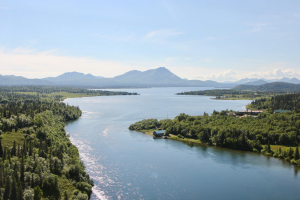
Bristol Bay, Alaska is the source of the largest sockeye run on the planet, located south of Iliamna Lake, at the terminus of several salmon rivers. The main communities are the town of Dillingham, pop. 2,500-ish; and the village & surrounding area of Naknek, pop. 900. Each summer upwards of 15,000 people arrive to disperse among these remote settlements to participate in the 2-month, $300 million frenzy of processing and harvesting that turns fish into money. Many Oregonians participate in this annual harvest as workers and bosses.
In 1918 approximately 40% of the residents of Bristol Bay died of the Spanish Flu epidemic that was brought to the region in part by the cannery ships just when the country thought the sickness had receded, which destabilized the local population and continues to influence village life as inherited trauma. Many villages lost most of the adult population; those orphans who survived have left behind grandchildren who are fighting to prevent the terrible history from repeating itself. The region has limited medical resources and access to the remote areas is by plane or boat only; while resources upgrade and change daily, the region has 0 ICU beds and 0 ventilators.
In an April 6 public letter addressed to Governor Dunleavy, the Curyung tribal council requested cancellation of the 2020 salmon season to prevent COVID19 from infecting and potentially killing its way through the region; tribal organizations from Naknek, King Salmon and South Naknek followed April 7 with a similar request. The Bristol Bay Working Group, which represents the Bristol Bay Economic Development Corporation, Bristol Bay Native Association, Bristol Bay Native Corporation, Bristol Bay Housing Authority, & the United Tribes of Bristol Bay sent a letter to the governor on April 15 asking for the cancellation of the 2020 season.
On Thursday, April 30, public radio station KDLG hosted a Town Hall with Q&A from Dillingham to discuss preparations for the salmon season, which is going forward despite these clear tribal requests to suspend the season to protect the vulnerable indigenous and watershed residents.
Taking questions in attendance were: Borough Manager Nathan Hill from the Lake and Peninsula Borough acting as host; Alaska Department of Fish & Wildlife biologist Tim Sands; Icicle Seafoods representative Julian Curry; Abby Fredricks from Silver Bay Seafoods; Trident Seafoods representative Shannon Carroll; state House Speaker and Dillingham resident Bryce Edgmon; Bristol Bay Borough Mayor Dan O’Hara; Dillingham Mayor Alice Ruby; Commissioner Adam Crum, Department of Health & Service; Heidi Hedberg from the Alaska Division of Public Health, unified command leader for the state; Public Health Nurse Judy Hollander; Mary Swain from Cami Clinic and Bristol Bay Regional Seafood Development Association (BBRSDA) Chair Fritz Johnson.
Not present are members of the above listed Bristol Bay Working Group.
Here is the full meeting with questions and answers as aired by KLDG
- KBOO
- KBOO


